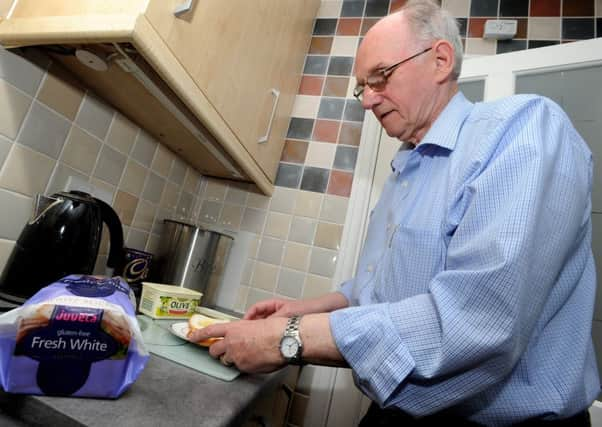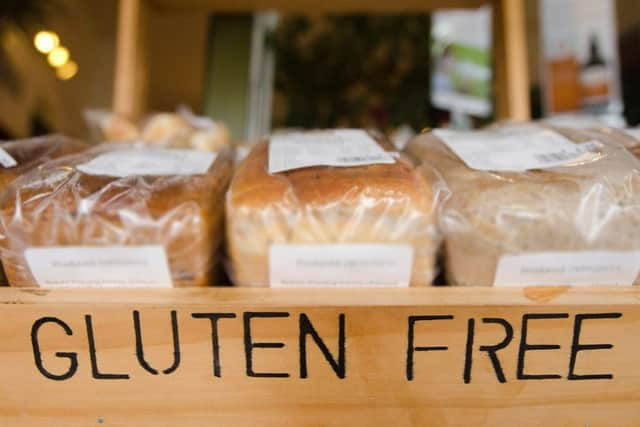The Great NHS Gamble: '˜We could save millions if pharmacists were able to prescribe'


The drive to save cash in the NHS is putting funding for treatments in direct competition, a charity has warned.


Advertisement
Hide AdAdvertisement
Hide Ad

Advertisement
Hide AdAdvertisement
Hide AdProposals for cuts to prescription budgets across England are pushing NHS chiefs into axing food prescriptions for people with coeliac disease, Coeliac UK has said.
It comes as analysis of plans aiming to slash £22bn from the NHS reveals five areas' plans alone hope to save £186m in prescribing costs.
An NHS report found last year the total community prescribing bill '“ not just for gluten-free food '“ for 2015 was £9,266.6 million, up from £8,852.6 million the year before.
Under national guidelines people who suffer from coeliac disease '“ a hypersensitivity to gluten '“ are supposed to be given gluten-free food, Coeliac UK says.
Advertisement
Hide AdAdvertisement
Hide AdBut around a third of England's 209 CCGs, the bodies responsible for commissioning health services, have already instructed GPs to stop doing so.
A total of £1.2m was spent on prescribed gluten-free foods in the Greater Manchester area alone, between April 2012 and March 2013.
Norma McGough, director of policy, research and campaigns at Coeliac UK, warned '˜short term' decisions are putting sufferers at risk.
She said: 'With the STPs one of the problems is lots of things get put in the pot together.
Advertisement
Hide AdAdvertisement
Hide Ad'We know it's almost like pitting one condition against another. It's not ideal to do that.
'I know it's about prioritising, but certainly with gluten-free prescribing, it's being stacked against vitamin D supplementation.
'Having a situation where we're comparing the sort of ongoing disease with vitamin D deficiency, it just doesn't seem right.'
Data compiled by the charity reveals 39 CCGs in England have stopped prescribing food, except for in exceptional circumstances, such as for young children or deprived patients.
Advertisement
Hide AdAdvertisement
Hide AdIt means a postcode lottery has developed, with some neighbouring counties offering differing levels of support.
Around 150,000 people in the United Kingdom have been diagnosed with coeliac disease, according to research in 2014.
A further 500,000 extra could be living in the UK undiagnosed, Ms McGough said.
'Coeliac disease is not a choice, it's a serious medical condition, when the body's antibodies attacks its own body when gluten is eaten,' Ms McGough added.
Advertisement
Hide AdAdvertisement
Hide Ad'If you continue to eat gluten then essentially there will be a risk of complications with coeliac disease and then there are problems of osteoporosis, due to malabsorption of calcium, then there's a rare risk of cancer.
'We understand the cost pressures for the NHS and obviously want to try to work with the NHS to make the cost efficiencies.'
Separately, Dr Tony O'Sullivan, co-chair of Keep Our NHS Public,'¨has warned putting restrictions on prescriptions may force people to seek private care.
A former clinical director at Lewisham Hospital who has more than 40 years of experience in the NHS, Dr O'Sullivan, said: 'The more restrictive the health service becomes, we're going to '¨make it more difficult for people.
Advertisement
Hide AdAdvertisement
Hide Ad'You won't be able to have two cataract operations, you'll have one eye not the other, you can have one hearing aid but not two.
'The more the waiting lists goes up for hip and knee replacements '“ certainly they're making changes so that people who can will go privately.'
'˜I feel I am being punished for my illness'
'I feel like I'm being punished for a condition I have no control over.'
When Stephen Russell lost weight and felt so lethargic and ill that he could not get out of bed in the morning, he feared he had cancer.
Advertisement
Hide AdAdvertisement
Hide AdStephen, 71, of Clayton-le-Woods, near Chorley, recalls: 'I felt so ill, I could not think straight and my whole body felt really bad.
'I went to the doctor and he suggested I went to hospital but there was a 13 week waiting list and I was so worried, I could not wait so I had a private consultation with a doctor.'
Stephen had a biopsy and an endoscopy and was told he had coeliac disease and had to stop eating wheat, rye and barley.
Stephen, who was diagnosed around 10 years ago, admits: 'When I was first diagnosed I did not understand coeliac, to me it was an alien thing I had no idea about.'
Advertisement
Hide AdAdvertisement
Hide AdWhen Stephen discovered he could get gluten free products on NHS prescription, he decided the only two products that were important were bread and pasta.
The year after his diagnosis, doctors discovered he had another disease of the stomach as well as Irritable Bowel Syndrome so Stephen could not have anything with grains or high fibre as well as gluten.
He says: 'We worked out there were only two breads I could have.
'Those two breads you can only get on prescription. You can't get them from supermarkets.
Advertisement
Hide AdAdvertisement
Hide AdWhen Stephen found out his CCG had stopped gluten-free prescriptions for those with coeliac disease in December, he went to the chemist to collect the bread he had already ordered and had to pay £70 for 16 loaves.
He explains: 'I get the bread in bulk and freeze it. The loaves are only small so I get through three a week.
'So it is now costing me £4.40 for a little loaf of bread.'
Stephen, married to Lesley, is a retired engineer and says for him it is like a cut to his pension.
Advertisement
Hide AdAdvertisement
Hide AdHe said: 'Lots of people with coeliac disease get things like biscuits and crackers on prescription but it's just the staple of bread that I want as I cannot buy the bread I need from the supermarket.
'I appreciate the problems the NHS has got and realise it needs to make savings. But you cannot do anything about coeliac disease.
'Here I am with an illness I cannot do anything about and I feel like I am being punished and penalised.
Sarah Sleet, Chief Executive Of Coeliac Uk
National charity Coeliac UK is strongly opposing the removal or restriction of gluten free prescriptions around the country for those battling coeliac disease, arguing that if the treatment for the condition was a drug, patients would not be facing this situation.
Advertisement
Hide AdAdvertisement
Hide AdClinical Commissioning Groups (CCGs) are responsible for the commissioning of NHS services at a local level including the prescribing of gluten-free staple foods. There are 209 CCGs and currently around 60 per cent of CCGs are following the National Prescribing Guidelines with over a third now restricting what is available on prescription.
While some are still prescribing gluten free products for those with coeliac disease, others are restricting products, with some CCGs having already partially or completely withdrawing the prescriptions resulting in a postcode lottery.
In many other areas, the policy on gluten-free prescribing is currently under review.
Coeliac disease is a serious autoimmune condition caused by a reaction to gluten, a protein found in wheat, barley and rye.
Advertisement
Hide AdAdvertisement
Hide AdCoeliac UK, believes any cuts to gluten free prescriptions will leave vulnerable patients with coeliac disease without support which will affect their ability to stick to the gluten free diet - the only treatment for the condition.
The potential serious long term health complications of not maintaining a gluten free diet include osteoporosis, infertility and, in some rare cases, small bowel cancer, conditions that could cost the NHS a lot more in the long run.
Sarah Sleet, chief executive of charity Coeliac UK, said: 'It is a very difficult situation.
'We completely understand the NHS is hard pushed for resources at the moment.
Advertisement
Hide AdAdvertisement
Hide Ad'But for people with coeliac disease, it is a life long condition and the only treatment is a gluten free diet. Unless you have to do it every day for the rest of your life, it is easy to think it is an easy diet to manage with the increasing availability of gluten free products.
'But it remains difficult because of the pricing.'
Gluten-free food staples such as pasta are three to four times more expensive than comparable gluten-containing products, gram for gram but gluten-free bread is six times more expensive than regular gluten containing bread in the supermarket.
On top of this availability is limited in rural areas, discount supermarkets and small stores.